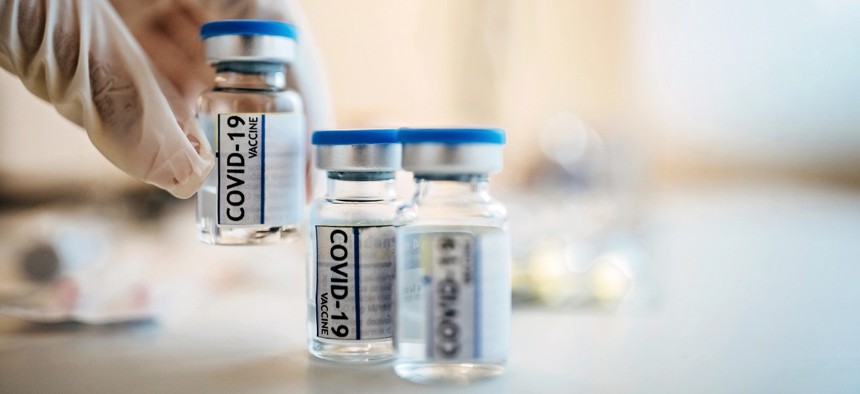
eclipse_images / iStock
Agencies Heed Recommendation to Pause Use of Johnson & Johnson Vaccine
Federal officials stress the blood clots are rare, but need review.
Federal agencies that are administering COVID-19 vaccines are following the federal recommendation to pause use of the Johnson & Johnson vaccine following reports of rare blood clots in six women out of more than 7 million people who have received the shots thus far.
The Food and Drug Administration and Centers for Disease Control and Prevention issued a joint statement on Tuesday morning urging a pause in inoculations while they review what happened. Agencies that received direct allocations started vaccinating employees over the winter, and some have been offering shots to their contractors. Some are also administering vaccines to larger communities.
“Our latest data show that we have administered more than 7.2 million doses of Johnson & Johnson vaccines and have yet observed only six of these cases,” said Dr. Rochelle Walensky, CDC director, during a briefing on Wednesday morning. (To date, more than 85 million and 99 million doses of the Moderna and Pfizer/BioNTech vaccines have been administered, respectively). The reasons for the pause are to ensure healthcare providers are using the appropriate treatment for these adverse events, which are different from typical blood clots, and to determine if there are additional cases. Additionally, an independent committee of experts will review the safety information, she said.
Pentagon Press Secretary John Kirby said in a statement on Tuesday that the Defense Department was “immediately pausing” the use of the vaccine.
“The safety of our force and their families is a top priority for the department,” he said. “We are communicating this pause to our military health facilities and are reviewing our global vaccine distribution to address this issue and ensure we can continue to provide vaccines to our DoD population at home and abroad.”
The Indian Health Service said the blood clots “appear to be extremely rare; however, COVID-19 vaccine safety is a top priority for the federal government and we are taking all reports of adverse events seriously.”
The agency added that this “will not have a significant impact on our vaccination plan” since the Johnson & Johnson vaccine made up about 1.5% of their recorded shots to date. “IHS does not expect this pause to affect IHS’ goal of fully vaccinating 44% of its active adult patients by the end of April.”
A Veterans Affairs Department spokesperson said, “VA has temporarily paused administration of the Janssen (Johnson & Johnson) COVID-19 vaccine to anyone who receives a vaccine from VA, including employees.” Those scheduled for the vaccine “will be rescheduled to either receive Moderna or Pfizer.”
Earlier this month, VA announced it had partnered with the National Archives and Records Administration to provide vaccines to NARA staff to support processing of VA claims, so the pause affects those employees as well.
In an email to employees shared with Government Executive, Dr. Pritesh Gandhi, the Homeland Security Department’s chief medical officer, said the department, which partnered with the Veterans Health Administration on vaccinations, is immediately implementing the pause on all J&J vaccines for all DHS employees and veterans.
He said that VHA clinical staff would be reaching out to female DHS employees under the age of 55 if they received the vaccine in the last two weeks. The CDC and FDA said the rare blood clots were found in six women between the ages 18 and 48 within 6 to 13 days of getting vaccinated.
Bob Fenton, acting administrator of the Federal Emergency Management Agency, said in a statement that FEMA immediately stopped “administering this vaccine at our pilot Community Vaccination Centers, as well as via our Mobile Vaccine Units.” He added, “We are working with our state partners to determine the path forward and find alternative vaccine options for these sites.”
The State Department has also temporarily halted use of the vaccine, according to a department spokesperson.
A spokesperson at the Office of the Director of National Intelligence said their “vaccine efforts are strong and continuing safely,” and they “are committed to providing our workforce with the resources our mission requires and the support we owe them.” Avril Haines, director of the Office of National Intelligence, said during a hearing on Tuesday that about 86% of the workforce has received at least the first shot (the Moderna and Pfizer vaccinations both require two shots for full protection while J&J requires only one).
The mass vaccination site that recently opened in Gaithersburg, Maryland, for essential, critical infrastructure federal employees has not been administering the J&J vaccine, a Health and Human Services spokesperson told Government Executive on Wednesday.
The Justice Department, which has been offering vaccines to part of its workforce, did not respond for comment.
Jeff Zients, White House coronavirus response coordinator, said during the White House briefing on Tuesday afternoon that the pause “will not have a significant impact on our vaccination program” since the Johnson & Johnson vaccine comprises less than 5% of the 190 million shots recorded to date.
Dr. Anthony Fauci, director of the National Institute of Allergy and Infectious Diseases, said he expects the pause to be “more like days to weeks, rather than weeks to months.” The CDC advisory committee on immunization practices met on Wednesday afternoon to review the six cases.







